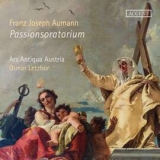Der Komponist Franz Josef Aumann, der ebenfalls Priester im Kloster St. Florian war, lebte von 1728 – 1797 und ist heute so gut wie vergessen. Er komponierte hauptsächlich kirchliche Werke, wie eben das katholische Passionsoratorium, bei dem der Dirigent der Aufnahme Gunar Letzbor in präziser Detailarbeit die in St. Florian aufbewahrten Fragmente zusammenfügte und eine Aufführungsfassung rekonstruierte. Diese ganze Arbeit wird sehr explizit im Begleitheft erklärt, und das Resultat kann sich hören lassen. Aumanns wunderbare Musik berührt tief und wird vom Ensemble Ars Antiqua Austria sehr überzeugend gespielt.
Die Minimalbesetzung von 4 Violinen und einer Orgel stehen 3 Solisten (Altus, Tenor, Bass) und zwei Soprane, die von den St. Florianer Sängerknaben übernommen werden, gegenüber. Somit wird die Intimität von Aumanns Musik und auch der narrative Charakter des Werkes mit seinen präzis ausgearbeiteten Stimmungen und Seelenzuständen in aller Schlichtheit dargestellt.
The composer Franz Josef Aumann, who was also a priest at St. Florian’s Monastery, lived from 1728 to 1797 and is almost forgotten today. He composed mainly sacred works, such as the Catholic Passion Oratorio, for which the conductor of this recording, Gunar Letzbor, has meticulously pieced together the fragments preserved in St. Florian and achieved to reconstruct a performance version. All of this work is explained very explicitly in the accompanying booklet, and the result is worth to be heard.
Aumann’s wonderful music is deeply moving and is played very convincingly by the Ensemble Ars Antiqua Austria.
The minimal instrumentation of 4 violins and an organ is contrasted by 3 soloists (alto, tenor, bass) and two sopranos, sung by the St. Florian Boys’ Choir. The intimacy of Aumann’s music and the narrative character of the work with its precisely elaborated moods and emotional states are thus presented in all their simplicity.
























